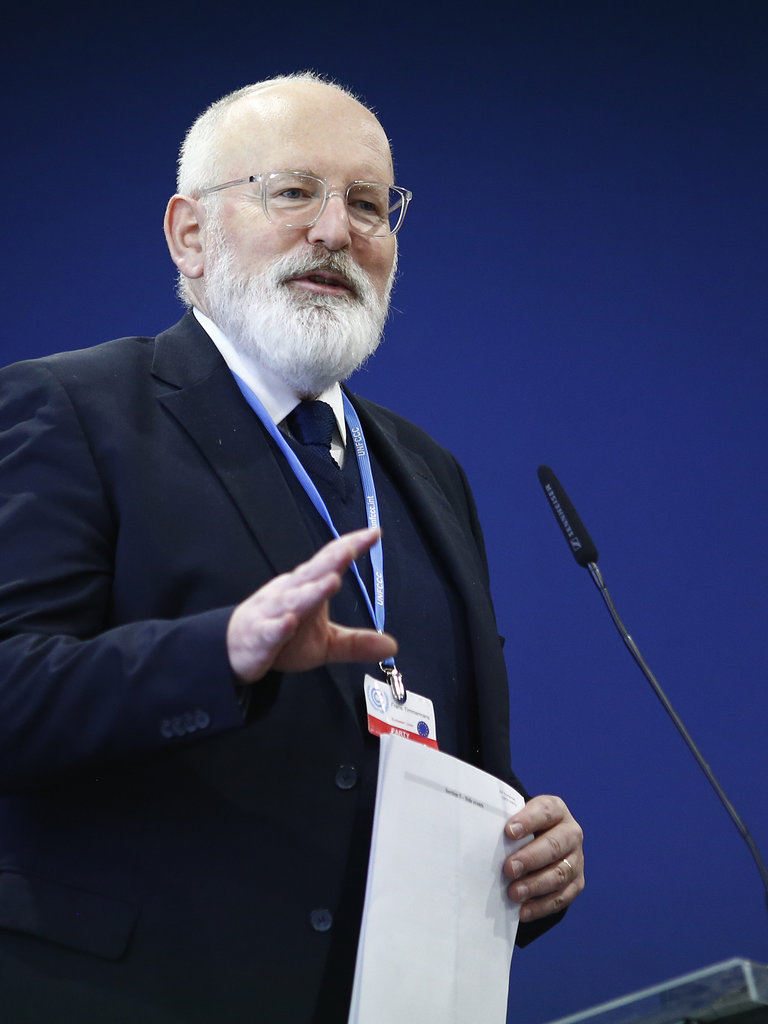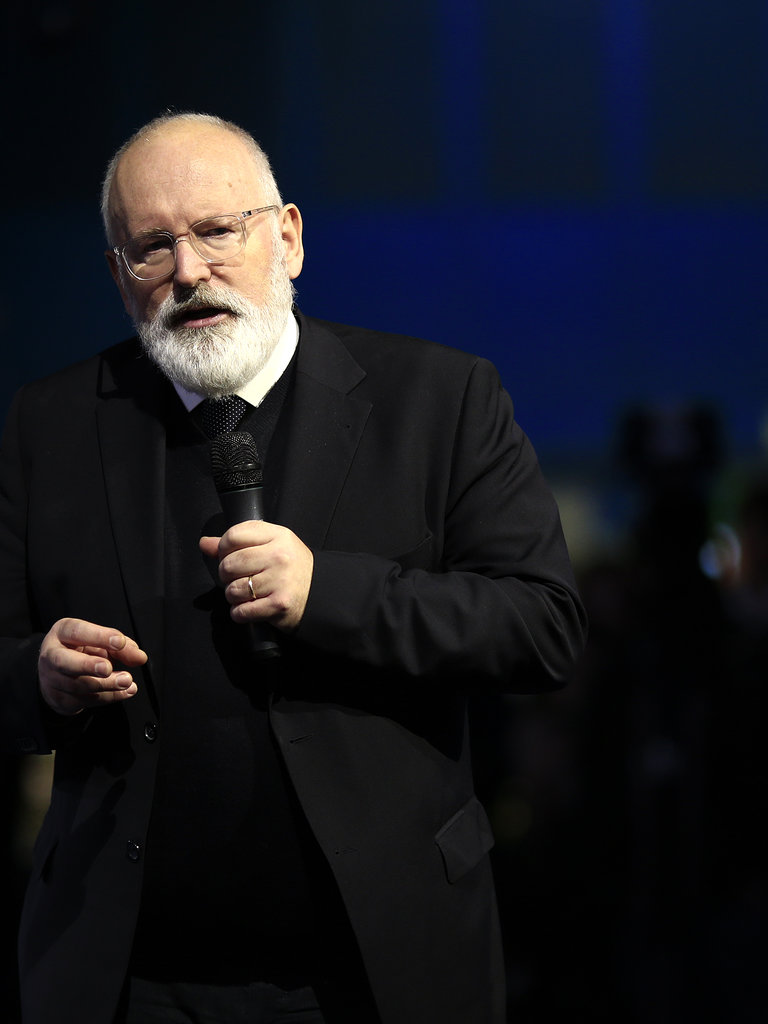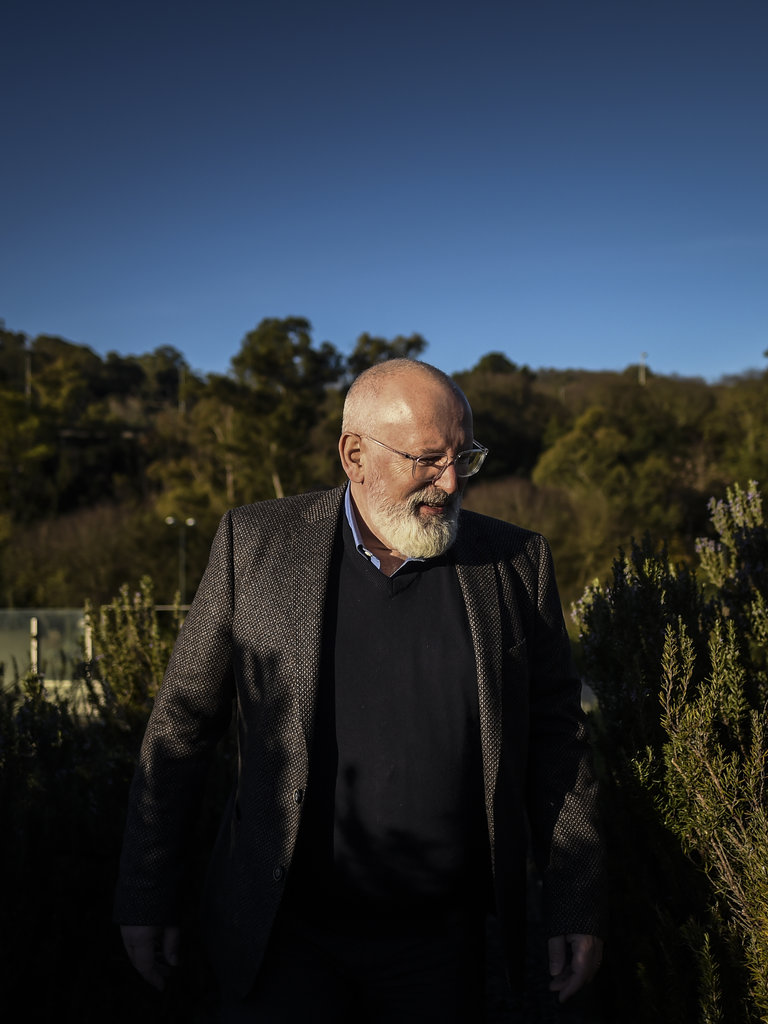
‘It’s possible! But for that to happen, we need to change course now’
European Commissioner Frans Timmermans on the energy transition
By: Merel Zeilstra, Jurjen Slump
As the European Commissioner responsible for the Green Deal, Frans Timmermans has been working for the past two years to make the green transition, including the energy transition, a reality. In recognition of his societal achievements in tackling climate change, Timmermans received an honorary doctorate from TU Delft. He also attended the opening of the anniversary celebrations. Altogether, plenty of reasons for an interview. An excellent opportunity to hear more about the climate agenda, the opportunities for accelerating the energy transition, and his personal motivation for his efforts.
Our warmest congratulations on your honorary doctorate from TU Delft. What does receiving this honorary doctorate mean for you?
“It’s a tremendous honour, and primarily serves as recognition for the European Green Deal achieved by my team, led by Delft alumnus Diederik Samsom, and by the European Commission as a whole. As the oldest and largest university of technology in the Netherlands, Delft is a bastion of intellectual freedom and outstanding research. That openness to people from across the world is also a sign of an open mind. These are essential values for an open society and also a necessary ingredient for the success of the green transition. Innovation, new technology and applications will be crucial in all kinds of areas.”
The COP26 climate summit in Glasgow probably failed to achieve the result you were hoping for. What does that mean for your climate and energy plans (Fit for 55)?
“We had indeed originally hoped to achieve more in Glasgow, but we actually ended up making more progress compared to what we thought possible just before it started. At the summit, the world found a new momentum, critical mass and the right direction of travel. First of all: before Glasgow, we were on track for a temperature increase of 2.4 °C, and the International Energy Agency (IEA) determined quickly that the new pledges could actually put the world on track for 1.8 °C – provided they are all implemented. Moreover, everyone is now accepting an increase of only 1.5 °C as the new norm.
“Secondly, there was a worrying shortfall of something in the region of $20 billion in the pledge made by developed countries to provide $100 billion annually to the poorest countries to enable them to take action on climate. The EU and its member states provide more than their share and we’ve pushed other countries to take responsibility too, especially the US. By joining forces, we hope to achieve the $100 billion by 2022. Thirdly, to effectively compare efforts made by different countries and ensure that the carbon market can operate effectively, data and methodologies need to be comparable. We achieved an important agreement on that in Glasgow. Finally, at COP26 the entire world stated for the first time that there is no future for coal. All of that is a positive achievement.”
What expectations do you have of the new Dutch government when it comes to the 2030 climate targets? What opportunities are there for the Netherlands to accelerate the energy transition?
“In Europe, the member states and the European Parliament have adopted a Climate Law to be climate neutral in 2050, and to reduce emissions by at least 55% to get there. Just like all other EU member states, the new Dutch government will need to align its policies to contribute to these targets, not an easy job for anyone. The Netherlands has conducted a very good analysis of our ‘Fit for 55’ proposals and its own Climate Agreement is leading the way in Europe. But the Climate Agreement is not enough. The good news is that the Netherlands has the resources, people and knowledge needed. The report by the Netherlands Environmental Assessment Agency shows that the Netherlands will probably achieve the 2030 climate target for renewable energy thanks to solar and wind.
“All in all, the Dutch energy infrastructure will need to be made future-proof, not only for 2030, but for 2050 too. The electrification of transport may be ahead of many other EU member states, but the Dutch infrastructure and the electricity grid can and must be modernised and expanded in order to cope with the ever-increasing production, storage and use of energy. Equally, on the road towards a hydrogen market, the Netherlands can lead the way by developing intelligent synergies between heavy industry and energy producers. It’s now a question of how decisive a new Dutch government can be in terms of going beyond the Climate Agreement and putting its ambitious target into practice. The new coalition agreement points in the right direction.”

In January, TU Delft celebrates its 180th anniversary. The theme of the anniversary will be the acceleration of the energy transition. In your view, where does Europe stand out in terms of its achievements in the energy transition? In what areas could there be improvements?
“The EU has demonstrated courage by no longer waiting for the rest of the world and taking a major step forward instead. Firstly, by agreeing that the EU will be climate neutral by 2050. Then by reaching agreement on a more ambitious target of at least 55% fewer emissions by 2030. Setting ambitious targets for decades in the future is relatively simple. The EU has gone further and is unique in the world in having an all-embracing step-by-step plan for the green transition, the so-called ‘Fit for 55’ package.
“Despite this, we must accelerate our energy diversification, especially if you consider developments in geopolitics and how certain powers don’t hesitate to use energy as a political weapon. Take hydrogen: too often the EU has lagged too far behind on technical developments and applications – when it comes to batteries and hydrogen, we need to work hard to maintain our leading position.”
Do you think we’re in a phase when we need all the different renewable energy options or that we should be starting to make hard choices in favour of solar, wind or hydrogen, for example?
“Each European member state is starting from a different position and is sovereign when it comes to its own energy mix. In some places in Europe, there is more sunshine and others have more potential for wind. Some countries are radically opposed to nuclear energy, whereas others are very much in favour. But, there is increasing consensus that coal has had its day. The importance of solar, wind, hydroelectric energy and hydrogen is also clear. In the long term, nuclear fusion may ultimately live up to its promise. New knowledge and discoveries will force us back to the drawing board. We need to continue to search, learn and adapt. In the meantime, we know that we will be able to use gas as we transition.”
Who really are the main players when it comes to enabling the energy transition? Politicians, scientists, businesses or citizens?
“It’s up to all of us. It’s up to governments to create the regulatory frameworks and the market to provide clarity and create a level playing field that will stimulate investment. Both public and private resources will be needed for further innovation. Citizens – and I’m specifically not talking about consumers here – also have their own responsibility, for example by changing old habits and replacing them with new, more sustainable ones. But, for that, it’s important that we are offered new accessible and affordable alternatives.
“I’d particularly like to pay tribute to young people, because without them, who took and are taking to the streets as part of ‘Fridays for Future’, there would never even have been a Green Deal. Similarly, further innovation will be impossible without a robust science sector. And when the market sees that there are major profits to be made from a green transition, there’ll be no stopping it. In all of this, I always highlight one thing in particular: this time, the new economy needs to take everyone with it. Ultimately, we’re not doing this for the planet – she can save herself without humanity – we do this for the health, well-being and prosperity of all people.”
At times, politics can obstruct innovation, because of outdated rules that fail to keep pace with the changing world, so how can delay be prevented?
“Democracy has been designed to have the right checks and balances to ensure that no single political actor or party can suddenly take on all of the power. At a time of crisis, some people can find this a problem. Nevertheless, the European Green Deal has come about at the political speed of light thanks to unprecedented agreement between the European leaders, parliaments and public opinion.
“After all, there's always an alternative and effective way of achieving growth and innovation, increasing prosperity and tackling the climate crisis decisively and effectively whilst at the same time disregarding human rights, democracy and freedom. China is doing it in its own way. We’re determined to move forward faster, but to do so democratically and inclusively.”
You are a key figure in the fight against climate change. Was there a time in your career or personal life that shaped what motivates you in terms of this issue?
"I readily admit that I’m a late convert. When, much to my surprise, (now former) President Jean Claude Juncker made me responsible for sustainability at the start of my first term in the Commission, I quickly became acquainted with the topic and discovered how alarming the climate and biodiversity crises really are. That’s why I put them front and centre during the 2019 European elections. The Green Deal is partly the result of that. It actually became very personal just over a year ago when my first grandson Kees was born. He's now a year old, is able to surf along the furniture and happily throws everything he can onto the ground.
“By 2050, he will be 31 years old. Just think – if we’re successful in this transition, he’ll be living in a liveable world. The great thing is, it’s possible! But for that to happen, we need to change course now. It’s time for us to adopt the same attitude as our parents and grandparents had after World War II; they did everything they could to make life better for their children. It’s important for my generation to accept that we’re planting trees in the knowledge that we will never ourselves be able to enjoy their shade and shelter. That’s why I talk about citizens who are part of something bigger, rather than about consumers who need to make the most of the here and now.”

What message would you like to give to TU Delft students and staff with regard to the energy transition and climate change?
“Our Western civilisation is under pressure –from within and without. Facts and science are being brushed aside and replaced by ‘opinions’. Democracy itself is sometimes even dismissed as ‘fake’. But, without shared truths and fundamental values it’s difficult to sustain a democracy. It’s important to stand up and speak out for facts and science and to continue to debunk untruths, myths and lies. This is a duty of every citizen, and that also includes you; it calls for civil courage. By the same token, I would say: make sure that your degree programme and everything you do is about more than just building up a sparkling CV en route to a great and well-paid job. Make sure that science encompasses not only ‘everything that is possible I will do’ but also ‘everything that I do also has a moral component and should ultimately serve humanity’.
“Shimon Peres once said to me that ‘progress in humanity is caused by dissatisfaction and curiosity’. That was our inspiration for the Green Deal and I’m sure that it’s also the inspiration for your university and your students who enjoy worldwide success in the Delft Dream Teams. You’ve been given a lot and it’s only fair that a lot is also expected of you. As far as this great transition is concerned, I hope you will approach the world with an open mind, help to write history and in doing so contribute to a better, liveable and free world for all of humankind.”
CV - Frans Timmermans
2019 – present First Executive Vice-President of the European Commission in charge of the European Green Deal and responsible for international EU climate diplomacy
2014-2019 First Vice-President of the EU Commission, in charge of Better Regulation,
Inter-Institutional Relations, the Rule of Law and the Charter of Fundamental Rights.
2010-2012 Minister of Foreign Affairs, the Netherlands
2007-2010 State Secretary, Foreign Affairs
1998-2007 Member of the Dutch House of Representatives, PvdA (Dutch Labour Party)
1987-1998 Diplomat, various positions, including in the Ministry of Foreign Affairs and at the Dutch Embassy in Moscow.
1980 -1985 Degree in French Language and Literature, Radboud University, Nijmegen & Postgraduate courses in European Law and French Literature, University of Nancy, France